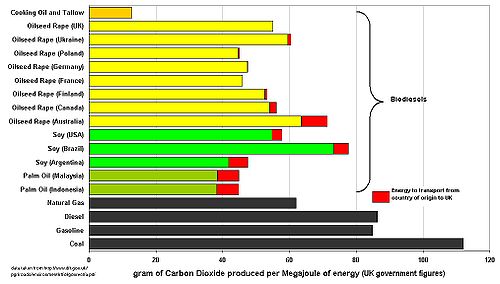
Biodiesel in the United Kingdom
Encyclopedia
Biodiesel
is rapidly becoming more common in a number of developed countries and the environmental effects of using biodiesel either as a blend
such as B20 (20% biodiesel and 80% petrodiesel) or as a straight fuel stock may be different in various countries. This is because the allowable amounts of sulphur and other compounds vary from country to country. Additionally, the average temperature in a country will dictate the amount of biodiesel that can be blended into the fuel supply before the cold filter plugging point
(the temperature at which the fluid will block a 45 micron filter) renders the fuel unusable. The national annex of BS EN 14214 specifies a maximum CFPP for B100 biodiesel of -15°C in the winter (16 November - 15 March inclusive) and -5°C for the rest of the year. As such, the benefits and disadvantages of biodiesel will vary from those in the United Kingdom
.
 Making and burning biodiesel contributes to atmospheric Carbon Dioxide
Making and burning biodiesel contributes to atmospheric Carbon Dioxide
to a smaller extent than burning Fossil Fuels. The calculation of exactly how much Carbon Dioxide is produced is a complex and inexact process, and is highly dependent on the method by which the biofuel is produced. The graph on the right shows the figures calculated by the UK Government for the Renewable transport fuel obligation
.
Biodiesel
Biodiesel refers to a vegetable oil- or animal fat-based diesel fuel consisting of long-chain alkyl esters. Biodiesel is typically made by chemically reacting lipids with an alcohol....
is rapidly becoming more common in a number of developed countries and the environmental effects of using biodiesel either as a blend
Blend
In linguistics, a blend is a word formed from parts of two or more other words. These parts are sometimes, but not always, morphemes.-Linguistics:...
such as B20 (20% biodiesel and 80% petrodiesel) or as a straight fuel stock may be different in various countries. This is because the allowable amounts of sulphur and other compounds vary from country to country. Additionally, the average temperature in a country will dictate the amount of biodiesel that can be blended into the fuel supply before the cold filter plugging point
Cold filter plugging point
Cold filter plugging point is the lowest temperature, expressed in 1°C, at which a given volume of diesel type of fuel still passes through a standardized filtration device in a specified time when cooled under certain conditions. This test gives an estimate for the lowest temperature that a fuel...
(the temperature at which the fluid will block a 45 micron filter) renders the fuel unusable. The national annex of BS EN 14214 specifies a maximum CFPP for B100 biodiesel of -15°C in the winter (16 November - 15 March inclusive) and -5°C for the rest of the year. As such, the benefits and disadvantages of biodiesel will vary from those in the United Kingdom
United Kingdom
The United Kingdom of Great Britain and Northern IrelandIn the United Kingdom and Dependencies, other languages have been officially recognised as legitimate autochthonous languages under the European Charter for Regional or Minority Languages...
.
Environmental benefits

Carbon dioxide
Carbon dioxide is a naturally occurring chemical compound composed of two oxygen atoms covalently bonded to a single carbon atom...
to a smaller extent than burning Fossil Fuels. The calculation of exactly how much Carbon Dioxide is produced is a complex and inexact process, and is highly dependent on the method by which the biofuel is produced. The graph on the right shows the figures calculated by the UK Government for the Renewable transport fuel obligation
Renewable Transport Fuel Obligation
The Renewable Transport Fuel Obligation in the United Kingdom is a requirement on transport fuel suppliers to ensure that 5 percent of all road vehicle fuel is supplied is from sustainable renewable sources by 2010...
.
See also
- BiodieselBiodieselBiodiesel refers to a vegetable oil- or animal fat-based diesel fuel consisting of long-chain alkyl esters. Biodiesel is typically made by chemically reacting lipids with an alcohol....
- Vegetable oil economyVegetable oil economyVegetable oil economy deals with the potential of vegetable oil to replace fossil fuels in the economy and how it compares to other potential replacements, including renewable electricity. Vegetable oils are the basis of biodiesel, which can be used like conventional diesel...
- Low-carbon economyLow-carbon economyA Low-Carbon Economy or Low-Fossil-Fuel Economy is an economy that has a minimal output of greenhouse gas emissions into the environment biosphere, but specifically refers to the greenhouse gas carbon dioxide...
- Energy cropEnergy cropAn energy crop is a plant grown as a low cost and low maintenance harvest used to make biofuels, or combusted for its energy content to generate electricity or heat. Energy crops are generally categorized as woody or herbaceous ....
- Energy securityEnergy securityEnergy security is a term for an association between national security and the availability of natural resources for energy consumption. Access to cheap energy has become essential to the functioning of modern economies. However, the uneven distribution of energy supplies among countries has led...
External links
- Towards Sustainable Production and Use of Resources: Assessing Biofuels, United Nations Environment ProgrammeUnited Nations Environment ProgrammeThe United Nations Environment Programme coordinates United Nations environmental activities, assisting developing countries in implementing environmentally sound policies and practices. It was founded as a result of the United Nations Conference on the Human Environment in June 1972 and has its...
, October 2009

